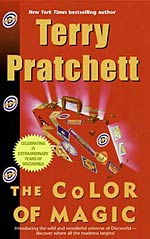
![]() attackofthebooks
attackofthebooks
3/13/2015
![]()
How does one rate a book published thirty years ago, by an author considered among the greats of our day, and that commences one of the most read and popular series in recent times?
The Color of Magic introduces us to Discworld, a series that has grown to include forty novels. Given that I didn't discover Terry Pratchett or Discworld until the 2004 Going Postal, which was number 33 in the series, it might be asked how I jumped in, as well as whether the series ends. Fortunately, each novel stands alone, and no new reader needs to have read previous books in order to understand what's going on in this one.
Since Going Postal, I've since read a couple of other Discworld novels, but I've never read the early ones. That changed when, a couple of months back, my good neighbor and friend Mike mentioned that he was looking for a good home for his substantial collection of Pratchett novels, including nearly all of the Discworld novels. I about wet my pants with excitement when I heard and couldn't wait to start reading.
The Color of Magic lays out the elements of Discworld that have since become familiar to millions (I once read that Pratchett's books had the distinction of being those most often stolen from booksellers in the British Isles): Discworld is flat. As is explained in another of the Discworld novels, when introducing the character Death:
"This is the Death whose particular sphere of operations is, well, not a sphere at all, but the Discworld, which is flat and rides on the back of four giant elephants who stand on the shell of the enormous star turtle Great A'Tuin, and which is bounded by a waterfall that cascades endlessly into space.
"Scientists have calculated that the chance of anything so patently absurd actually existing are millions to one. But magicians have calculated that million-to-one chances crop up nine times out of ten."
If that doesn't give you enough of a taste to tell that Discworld is not only part fantasy but also partly tongue-in-cheek satire, then one need only get to know the heroes of the quest to realize how little Pratchett takes his fictional world seriously (unless you consider being serious about writing a rollicking good story, which Pratchett is). Rincewind is the wizard who lacks any real wizarding skills, except perhaps that he's very good at dodging death (both in the abstract and the concrete in the person of Death). Along for the ride, if as the ostensible McGuffin, is Twoflower, a tourist from a far of empire who is oblivious to danger, and The Luggage, a semi-sentient and energetic piece of luggage made from sapient pearwood, and Cohen the Barbarian (and he's not a mockery of Schwarzenneger's Conan, I'm not sure what is).
Each is a riff or commentary, delightfully and humorously drawn to entertaining effect, and it's not hard to hear echoes of Mark Twain and Douglas Adams in Pratchett's writing, though, to be honest, Pratchett is a flavor all his own. Here are a few lines that Pratchett slips in, each full of commentary and satire, and yet humorous all on their own:
And Pratchett's The Color of Magic is anything but "boredom." If you've never had the opportunity to enjoy a Discworld novel, The Color of Magic is a fantastic place to begin.
(And many thanks, Mike, for gifting me the wonderful lands of Discworld.)
http://www.attackofthebooks.com/review-the-color-of-magic-by-terry-pratchett/